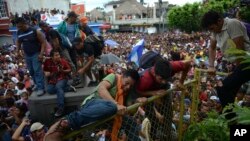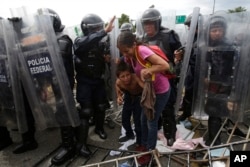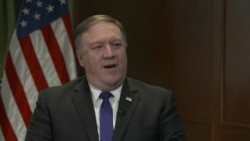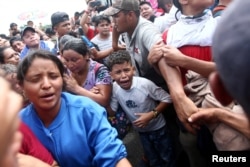The presidents of Honduras and Guatemala are set to meet Saturday to implement a strategy to return a caravan of thousands of migrants to Honduras after U.S. President Donald Trump warned the convoy must be stopped before it reaches the U.S.
A standoff between the migrants and Mexican police continued as they settled on a bridge separating Guatemala and Mexico, with some clinging to the closed border gate crying "there are children here."
The migrants broke through the fence Friday, running into a wall of police in Mexico, whose government has promised the U.S. will confront the caravan.
Mexican television footage showed hundreds of migrants streaming onto the bridge and being met on the other side by a line of Mexican police in riot gear.
Witnesses say some of the migrants threw rocks and other objects at Mexican security forces, who used pepper spray to force the migrants to retreat.
Mexican President Enrique Pena Nieto said Friday night in a nationally televised address that, "Mexico does not permit and will not permit entry into its territory in an irregular fashion, much less in a violent fashion."
Honduran President Juan Orlando Hernandez posted on Twitter late Friday that he and his Guatemalan counterpart, Jimmy Morales, have asked for clearance to send civil protection personnel to help the Hondurans at the border, and is looking for ways to return the migrants to Honduras, where their march began.
"I also asked authorization to hire ground transportation for anyone who wants to return and an air bridge for special cases of women, children, the elderly and the sick," Hernandez tweeted.
The caravan has angered Trump and his top diplomat, Secretary of State Mike Pompeo, who met in Mexico City Friday with his Mexican counterpart, Luis Videgaray, who vowed to meet the "challenge" of the caravan.
Pompeo told VOA Contributor Greta Van Susteren Friday that Mexican officials want to create a situation where migrants “understand that it is not fruitful to transit though Mexico into the United States.”
WATCH: Pompeo on Migrants Heading to US-Mexico Border
He said the caravan is “not organic” and is being underwritten by political opponents of the Honduran leadership. “This is not just a group of people who happen to wander together into a big group,” he said.
The caravan of nearly 3,000 people left San Pedro Sula in Honduras late last week, making its way through Guatemala's muddy jungle and residential streets to reach Mexico and hoping eventually to reach the United States.
On Thursday, Trump threatened to send the military to close the southern U.S. border unless Mexico stops what he calls an "onslaught" of Central American migrants. Trump claims there are criminals among the migrants and is urging Mexico "in the strongest terms" to stop them.
"The assault on our country at our Southern Border, including Criminal elements and DRUGS pouring in, is far more important to me as President than Trade or the USMCA (US Mexico Canada Agreement)," Trump tweeted Thursday.
"He's making a political calculation," said Marcelo Ebrard, Mexico's incoming foreign minister, about Trump's posting on Twitter, in a reference to U.S. mid-term elections in November. Ebrard said in a local radio interview Trump's comments were "predictable."
While Trump has threatened to deploy the military to the border, Lieutenant Colonel Jamie Davis said Thursday the "Department of Defense has not been tasked to provide additional support."
Mexican officials say they will not let the migrants enter as one large group. Instead, individuals must show a passport or visa to cross the border, or apply for refugee status.
Mexico's government has sought assistance from the United Nations High Commissioner for Refugees (UNHCR) to help process migrants claiming refugee status, which could help it to disperse the caravan.
Mexican Foreign Relations Secretary Videgaray said in an interview with the Televisa network that those who want to apply for refuge in Mexico will be welcome to do so “if they have a vulnerable situation in their country of origin.”
The Mexican government has said any migrant who decides to cross illegally will be detained and deported.
Honduras is one of the most violent nations in the world, partly because of gangs and drugs.
Many of those trying to get to the U.S. want to escape violence and poverty.
VOA's Wayne Lee and Fern Robinson contributed to this story.









